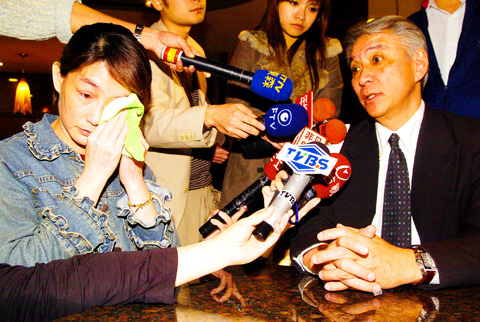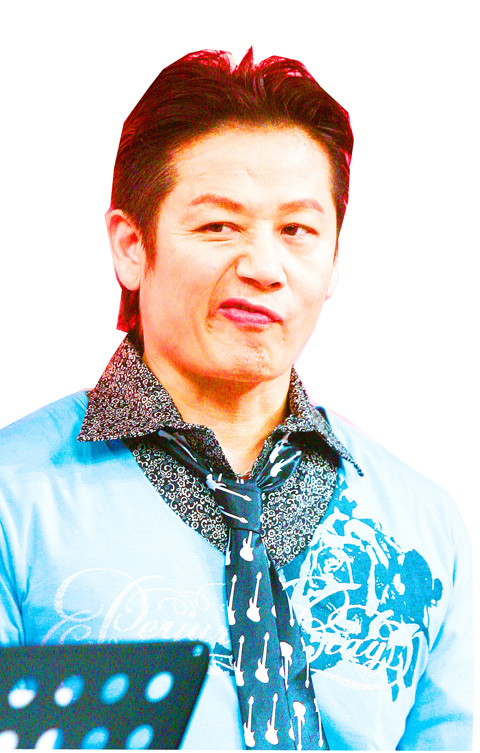This week’s gossip rags have been dominated by domestic quarrels between retired stars with names that seem to come from another era. A suspected extramarital affair, alcoholism, domestic violence and other unspeakable skeletons in the family wardrobes are playing out in the public sphere like a juicy soup opera plot.
First to kick off the melodrama was actor-turned-hypnotherapist Hsu Ming (徐明) and Ying Tsai-ling (應采靈), who tied the knot with Hsu at the height of her acting career 26 years ago. China Time Weekly (時報週刊) reported that Ying last week moved out of the marital home with four pet dogs after Hsu accused her of having an affair with the couple’s next-door neighbor and, while under the influence, beat up the alleged paramour.
Bouts of grouching and bickering ensued, which were widely interpreted by the media as reenactments of the couple’s past roles in cheesy television drama series some 20 years ago.

PHOTO: TAIPEI TIMES
Though the pair reconciled with a big hug in front of the press on Tuesday, a possible lawsuit awaits China Time Weekly as Hsu remains inflamed by the magazine’s accusation of infidelity.
Meanwhile, a different husband-and-wife tiff appears to have taken a tragic turn in the story of the divorced couple Chang Chen-huan (張振寰) and Pao Cheng-fang (鮑正芳).
Once a sought-after TV actor, Chang now lives on loans from friends, works odd jobs and is consumed by alcoholism and depression, or so it seemed as he recounted his miserable life to invited media in front of the food stand he works at.

PHOTO: TAIPEI TIMES
Chang was portrayed as a pitiful man denied the chance of visiting his son by his ex-wife. A different side of the story the following day, however, when a tearful Pao suggested Chang had abused her and threatened her with a knife.
In litigation-related news, veteran entertainer Chen Chin-pei (陳今�?as found guilty for publicly insulting retired singer Hsieh Lei (謝雷) by calling him an “old gay” while appearing on a TV variety show about three years ago.
Chen was fined NT$9,000 after failing to convince the judge that the word gay is a neural term for unmarried men. Pop Stop fails to see how being called old and gay could be used as a “serious” insult.
Also on the legal front, political show host Cheng Hung-yi (鄭弘儀) filed both civil and criminal suits against pan-blue-camp entertainer Hsu Nai-lin (徐乃麟) for calling him a black-hearted, or hei xin, (黑心), in public. Hei xin goods refers to Chinese merchandise that is hazardous to public health. Hardly an imaginative putdown.
The squabble began when pan-green-camp host Cheng reportedly expressed his eagerness to host president-elect Ma Ying-jeou’s (馬英九) inaugural ceremony on May 20, free of charge. Hsu later backed down by saying he had borrowed the term “hei xin goods” from entrepreneur Robert Tsao (曹興誠) to refer to political talking heads in general.

Every now and then, it’s nice to just point somewhere on a map and head out with no plan. In Taiwan, where convenience reigns, food options are plentiful and people are generally friendly and helpful, this type of trip is that much easier to pull off. One day last November, a spur-of-the-moment day hike in the hills of Chiayi County turned into a surprisingly memorable experience that impressed on me once again how fortunate we all are to call this island home. The scenery I walked through that day — a mix of forest and farms reaching up into the clouds

With one week left until election day, the drama is high in the race for the Chinese Nationalist Party (KMT) chair. The race is still potentially wide open between the three frontrunners. The most accurate poll is done by Apollo Survey & Research Co (艾普羅民調公司), which was conducted a week and a half ago with two-thirds of the respondents party members, who are the only ones eligible to vote. For details on the candidates, check the Oct. 4 edition of this column, “A look at the KMT chair candidates” on page 12. The popular frontrunner was 56-year-old Cheng Li-wun (鄭麗文)

“How China Threatens to Force Taiwan Into a Total Blackout” screamed a Wall Street Journal (WSJ) headline last week, yet another of the endless clickbait examples of the energy threat via blockade that doesn’t exist. Since the headline is recycled, I will recycle the rebuttal: once industrial power demand collapses (there’s a blockade so trade is gone, remember?) “a handful of shops and factories could run for months on coal and renewables, as Ko Yun-ling (柯昀伶) and Chao Chia-wei (趙家緯) pointed out in a piece at Taiwan Insight earlier this year.” Sadly, the existence of these facts will not stop the

Oct. 13 to Oct. 19 When ordered to resign from her teaching position in June 1928 due to her husband’s anti-colonial activities, Lin Shih-hao (林氏好) refused to back down. The next day, she still showed up at Tainan Second Preschool, where she was warned that she would be fired if she didn’t comply. Lin continued to ignore the orders and was eventually let go without severance — even losing her pay for that month. Rather than despairing, she found a non-government job and even joined her husband Lu Ping-ting’s (盧丙丁) non-violent resistance and labor rights movements. When the government’s 1931 crackdown